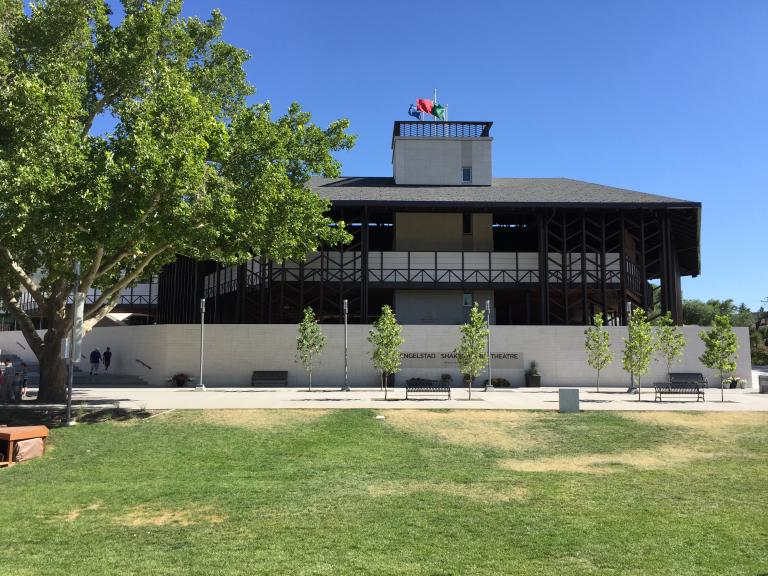
We’re just back from Cedar City where, today, we took in an afternoon performance of The Foreigner (in the Randall Jones Theater) and an evening performance of The Merchant of Venice (in the Engelstad Shakespeare Theatre).
This is at least the third time, and perhaps the fourth, that I’ve seen The Foreigner. It’s a very — very — funny play.
The Merchant of Venice is powerful, eloquent, and, at points, distinctly uncomfortable for a contemporary audience. Shylock is an often unappealing character, but the casually cruel anti-Semitism of those around him is painful to watch. On the other hand, Shakespeare — or Edward de Vere, or whoever he was — who was almost certainly an anti-Semite by today’s standards, also makes Shylock a figure for whom we have empathy and emphasizes the common humanity shared by both Jews and Christians:
“Hath not a Jew eyes? Hath not a Jew hands, organs, dimensions, senses, affections, passions; fed with the same food, hurt with the same weapons, subject to the same diseases, healed by the same means, warmed and cooled by the same winter and summer as a Christian is? If you prick us, do we not bleed? If you tickle us, do we not laugh? If you poison us, do we not die? And if you wrong us, shall we not revenge?” (Shylock, in The Merchant of Venice III.i)
Four, I think, of the masculine roles in the play were taken in this production by women — notably Leslie Brott as the merchant Antonio and Lisa Wolpe as Shylock. Ms. Brott is a fine actress and a perennial favorite at the Festival, but I didn’t think she really worked in a man’s role. It was distracting. On the other hand, Lisa Wolpe was magnificent as Shylock — not, though, because she’s a woman but in spite of it. Frankly, had I not known beforehand I might not have detected that he was a she.
On the whole, I don’t think having women play those roles added richness or extra layers of meaning to the play. But the best parts in Shakespeare are, for the most part, men’s roles, so I guess it was a nice move to give these excellent actresses a shot at them.
I’ve already written about our first play yesterday, Big River. Excellently done. But I haven’t mentioned the play that we saw last night. We were scheduled to see Shakespeare’s The Merry Wives of Windsor, but we rearranged our schedule so that we could see An Iliad, by Lisa Peterson and Denis O’Hare, instead. (We’ll pick The Merry Wives up in a couple of weeks.) There was, unfortunately, only a relatively small audience for An Iliad there in the Randall Jones, but it was a remarkable theatrical experience for everybody in attendance. Essentially a one-man play — this production features Brian Vaughn, who is the Utah Shakespeare Festival’s artistic director and a hugely popular actor with regular Festival attendees — with minimal to nonexistent stage scenery, it’s a powerful anti-war play drawing on, but scarcely limited to, Homer’s Iliad, in the translation by Robert Fagles. (There are a few scattered quotations from the Greek original and particularly from the opening line of the Iliad, which I was delighted to hear since, many years ago, I memorized the Iliad‘s opening lines, and I still remember them.)
The Poet — the role played by Brian Vaughn — is Homer, but more than Homer: He has witnessed and chronicled every war in human history, from long before Troy, among the Sumerians, to today’s wars in Syria and Iraq. And this play shows why Homer is still relevant today, still worth discussing.
Anyway, we’re now two thirds of the way through this visit to the Utah Shakespeare Festival, and I repeat what I said yesterday: The Festival is a treasure. There should be absolutely no empty seats at any performance.
***
Meanwhile, my Malevolent Stalker, who has been posting hostile pseudonymous comments about me for something on the order of fifteen years now — he’s missed relatively few days and very few weeks — spent part of his day today doing what he most enjoys: posting about me. It seems that I’m “defined” by my dishonesty, my viciousness, and my lack of ethics. (I’m surprised that my Stalker omitted mention of my perpetually seething hatred. That’s usually one of his favorites.)
Posted from St. George, Utah










